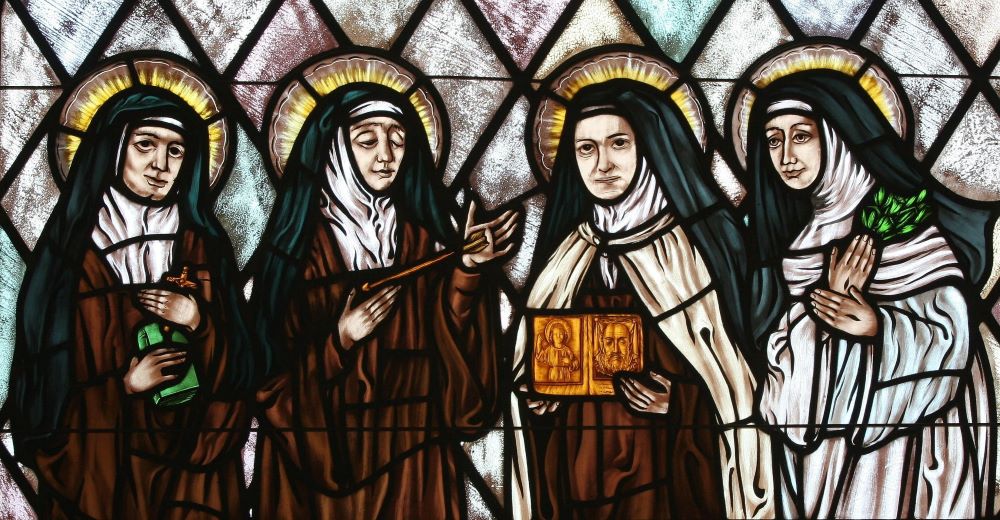
St. Therese of Lisieux is featured holding an image of the Holy Face in this stained glass depiction of female saints in the church of St. Therese, Montauk, N.Y. Illustrated are Sts. Teresa Benedicta of the Cross, Theresa of Avila, Thérèse of Lisieux and Catherine of Siena. (OSV News/Gregory A. Shemitz)
Over the past few months, the internet has been teeming with memes riffing on singer Charli XCX's latest album, "BRAT." Though the internet has yet to settle on one single definition, being "brat" is decidedly a good thing. (In what could be taken as an endorsement, Charlie XCX herself once tweeted that "Kamala IS brat.") As her feast day is Oct. 1, I think it's only fitting to add St. Thérèse of Lisieux to the list of all things brat. Allow me to explain.
Most of us experience the entrance into young adulthood as fraught with confusion, frustration and constant reminders of our own inadequacy. But I would argue that if you're an only child like me, it's particularly intense.
I'll admit it: The rude awakening of having to take responsibility for my own career path and life decisions stripped me naked. The illusion that mommy and daddy would figure it all out for me wore off when I got my first full-time job, in which I was subject to the authority of someone unwilling to give me an easy break when I boo-hooed to them, or to give me a raise merely because I wanted it.
Entitlement is not generally seen as a commendable virtue. Think of the beatitudes: "Blessed are the poor in spirit … those who suffer … those who mourn." The beatitudes are hardly an invitation to hearts engorged with excess. Should we really expect to enter eternal life just because we want to?
And yet the "childishness" of such an entitled attitude is exactly what allowed St. Thérèse of Lisieux (also known as "Thérèse of the Child Jesus") to grow in simplicity of spirit and to live "like a child" before the great Mystery of God.
These days, the attainment of material wealth and an infinite amount of finite goods seems to dominate our sense of self and purpose in life. St. Thérèse's sense of entitlement offers us a more enriching — and lasting — alternative.
In her autobiography, Story of a Soul, Thérèse recounts a moment from her early childhood in which her older sister Leonie offered her and her other sister Celine a chance to pick from a basket of toys:
One day Leonie, thinking no doubt that she was too big to play with dolls, brought us a basket filled with clothes, pretty pieces of stuff, and other trifles on which her doll was laid: "Here, dears," she said, "choose whatever you like." Céline looked at it, and took a woollen ball. After thinking about it for a minute, I put out my hand saying: "I choose everything," and I carried off both doll and basket without more ado.
Thérèse, the baby of the family, was used to special treatment. She admits to having been spoiled as a child, but recognizes the value it had as she pursued her vocation in the Carmelite convent of Lisieux:
This childish incident was a forecast, so to speak, of my whole life. Later on … I understood that there are many degrees of holiness, that each soul is free to respond to the calls of Our Lord, to do much or little for His Love — in a word, to choose amongst the sacrifices He asks. And then also, as in the days of my childhood, I cried out: "My God, I choose everything, I will not be a Saint by halves, I am not afraid of suffering for Thee, I only fear one thing, and that is to do my own will. Accept the offering of my will, for I choose all that Thou willest."
This whimsical anecdote from the childhood of a "spoiled brat" is telling of the markedly Theresian spirituality that manifested during her life in the convent, and even more so in her heavenly life, from which she promised to offer "a shower of roses, doing good" for those on earth. Her sense of entitlement took on new meaning as she matured: Rather than expecting to always get every material good she asked for, she expected to be embraced and blessed by Christ every time she turned to Him.
This conversion required a renunciation.
In asking for every spiritual good rather than for every material good,Thérèse understood that the willingness to sacrifice and suffer was necessary. And yet her desire to receive God, who is truly "Everything," made it so that suffering was an opportunity to express her love for the One who satisfies her infinite desire for "everything."
These days, the attainment of material wealth and an infinite amount of finite goods seems to dominate our sense of self and purpose in life. Thérèse's sense of entitlement offers us a more enriching — and lasting — alternative.
The human desire for "everything," for a sense of completeness and fullness in life, is inherent to us who were made in the image and likeness of God. Yet the materializing of the desire sets us up to fall short in our pursuit of real fulfillment. Instead, we ought to look more deeply into our hearts with childlike simplicity and ask if the "everything" we seek is finite, or if it is the One who is Infinity itself.
Advertisement








